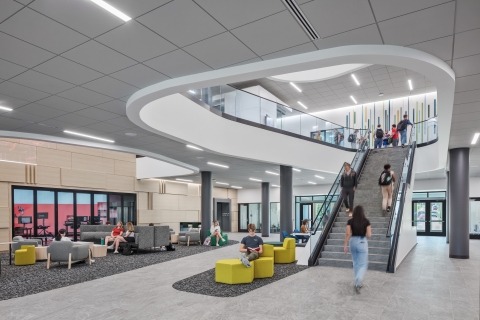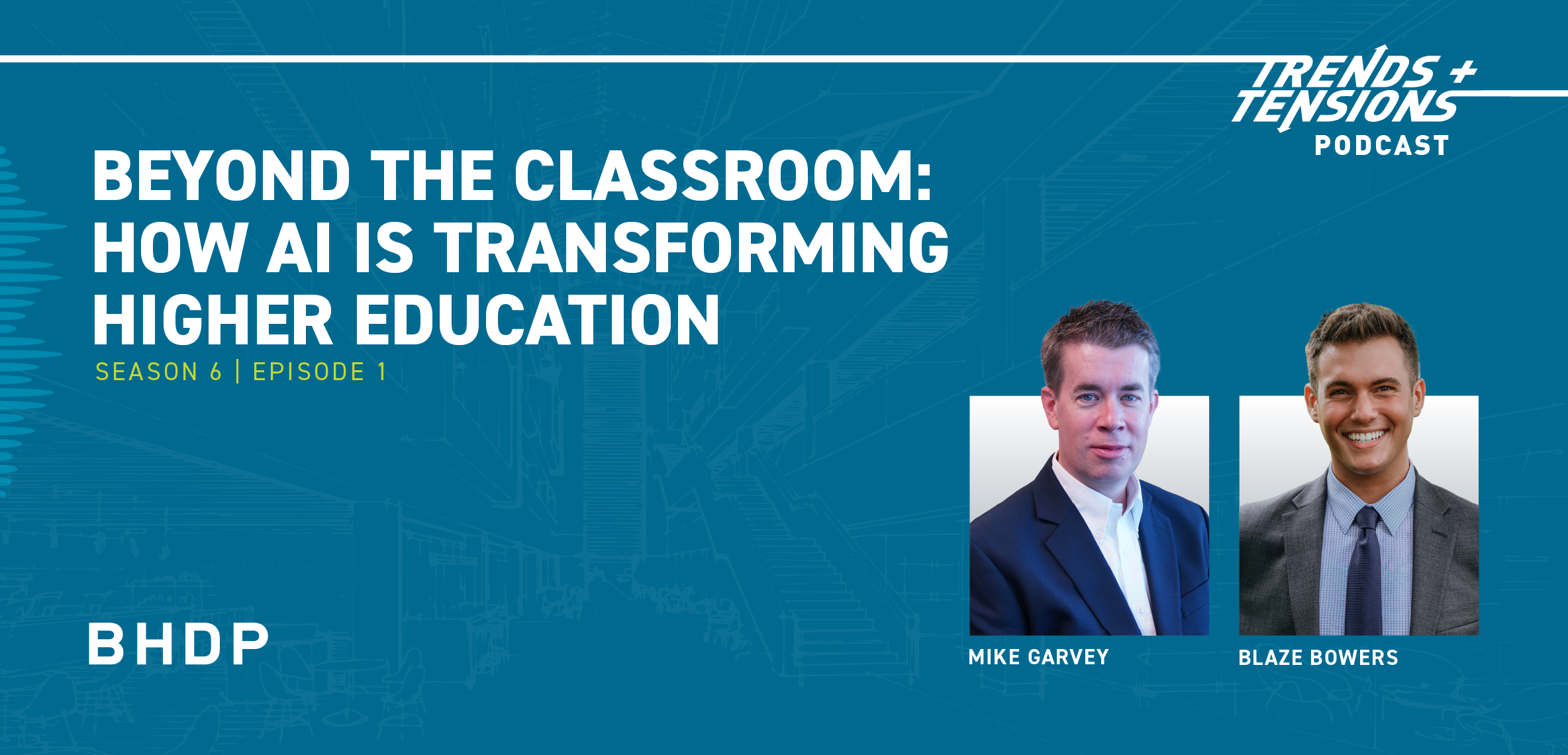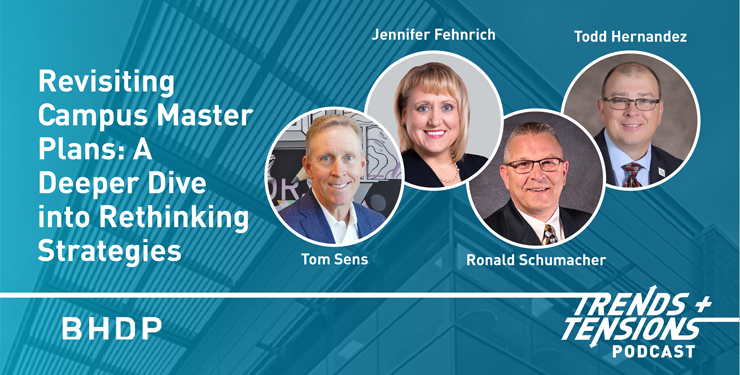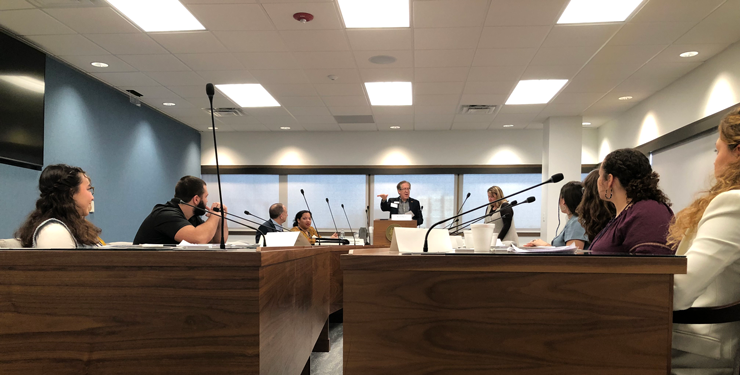
Beyond the Classroom: How AI is Transforming Higher Education

Want to listen on another platform? Choose your platform here.
Episode Transcript
[Music Intro]
Brian Trainer, Host: Welcome to Trends + Tensions, presented by BHDP, where we discuss Trends in Architectural and Interior design and the competing priorities or Tensions that arise from integrating new ideas into existing organizations, enterprises, and institutions. In this episode, “Beyond the Classroom: How AI is Transforming Higher Education,” we are joined by Blaze Bowers, a lecturer at the University of Tennessee Knoxville and a director for a national higher education firm that supports schools in the Title IX, equity, and compliance spaces, and Mike Garvey, a Client Leader at BHDP. I am your host, Brian Trainer, senior strategist for BHDP. Let’s get started.
Brian: Welcome to Trends + Tensions. I will let you each introduce yourself. Starting with Mike. Who are you, and what do you do?
Mike Garvey: I'm happy to be here. Thank you for having us today, Brian. My name is Mike Garvey, and I work for BHDP architecture in a Client Leader role. I am the Higher Education Client Leader for the Southeast, and essentially, that means I'm out there looking for prospects and opportunities. I'm working on our existing client relationships and helping drive the business of architecture for BHDP, specifically within the higher education space.
Brian: Perfect. Thank you, Mike. Blaze, tell us who you are and what you do.
Blaze Bowers: Yeah. Thank you all so much for having me today. It's a pleasure to join Mike and you all for the podcast. My name is Blaze Bowers. I am a lecturer with the University of Tennessee Department of Educational Leadership and Policy Studies and a regional director for a higher education compliance firm that supports institutions nationwide in the Title IX equity and compliance space. I have been in my current role for about 6 months and have been in higher education for many years before that. I am very excited to dive into our material today and to talk about something very near and dear to, I think, both my and Mike's hearts and minds.
Brain: Yeah, that gets us to our topic at hand. There's a lot of things that I'd love to talk to you more about within your title there, Blaze. But specifically, what we're talking about is AI and its impact on higher education, right? So, the artificial intelligence sphere. So, what drew, if I can ask, what drew you to researching AI and higher ed in the first place? Like, how did you wind up in this realm? And then we'll talk about some of the things that you're looking into, if you don't mind.
Blaze: Absolutely got pulled into the topic pragmatically. I was working, at the time, as a chief student affairs officer and really trying to understand the intersection of this developing field of artificial intelligence as it related to student success student affairs. I was also serving as an instructor in the classroom at that time and understanding how does it intersect with academic integrity, and student work product. Generally, I got pulled into the subject by necessity. How do I understand this issue of artificial intelligence to ensure that we're equipping students and employees and that we as a field understand, “what does this mean for the enterprise of higher education?” It became clear very quickly that it was going to be transformative in the space of higher education.
Brian: Gotcha. So, Mike, same question to you. How did you wind up in the sphere of AI and higher education?
Mike: It's interesting, I encountered it in a in a few ways over the last couple of years. I used it, for instance, a couple of years ago to generate a schedule for a Fantasy Football League, and it's an interesting sort of low-level thought experiment, but I started to see that this was a technology, and I have a whole background in technology, saw that this was an emerging technology that is not going away. It's something that is here to stay. As with a lot of technologies, we can choose to either embrace them or run from them in fear. I was at a higher education conference, and I wandered into a workshop panel where my awesome co-host here was sort of helping lead and moderate the discussion. there was an example that came up during that workshop that has always stuck with me. They were talking about how students at one institution had figured out that they could use AI translation tools to game the system. They could take an exam or a paper rather than an essay. They could run it through Google Translate or one of those similar services. Translate it from English into Italian or another European language, and then take that same paper and run it back through the translation AI tool back into English, and then turn it in. In doing so, that would circumvent the sort of “Turn It In” AI system that was designed to catch plagiarism.
Brian: Right!
Mike: So that innovation is fascinating because, like, if you just applied that kind of thought energy to actually doing the assignment, you probably go a long way, but at the same time, it sort of opened my eyes to the kind of problems that higher education is facing. And I thought we probably have a role in helping them with this.
Brian: That's interesting because it almost addresses one of the big fears about AI is that you know, we're not going to create things anymore. And so, we're trying to do some gatekeeping, I guess, with the software to say, alright, how do we make sure people are being authentic in creating their own works, but then suddenly there's an innovation loop in there. It's like, how do I get around this? And I think that's where a lot of anxiety surrounds AI nowadays. It's like, is it a good thing or a bad thing? And I guess it depends on how you use it, but I know both of you have been researching AI and the impact on higher education currently. And I wondered what things have you found? What interesting topics are there that are emerging currently?
Blaze: Looking at things like the Chronicle of Higher Education and Inside Higher Ed, and quite frankly, one of the greatest boons of information you could find, LinkedIn, you can scroll through LinkedIn and find about the most interesting things that you would imagine. I've come across research that addresses a few particular areas, and the ones that have caught my attention are number one, student success space. Especially the academic success space. AI has faced in every industry around the globe with a particular opportunity and a threat, and we can talk about the difference between the two throughout the podcast. But I think one of the unique opportunities and threats that it's posed to higher education is that we are sort of the enterprise that's been charged with creating information, creating knowledge, issuing scholarships, and doing research, and AI has entered the scene. It's been the question of, well, if AI can do it, what are the scholars supposed to do? What are the students in training to do so? I've been particularly interested to see how it is affecting student success in the way of students in their drafting of literature. What is drafting a report in the age of AI look like for a student? What does the classroom experience look like for a student when instructors have to create assessments that assess the student's knowledge, not AI's knowledge, knowing that students have access to AI? I've also been fascinated by the recruitment, hiring, and employment space, as well as the algorithmic nature of AI, which I've just begun to understand through this research. There's questions of employment practices. What does AI do in the recruitment process? What information has been provided to it? Because AI grows and evolves based on what we input into its various frames.
Blaze: But there have been concerns about employment discrimination law and equal opportunity law as it relates to recruiting faculty, staff, and students. What does it review when it gets a resume, right? What does it look for in a resume? How does it weigh the pros and cons of a resume or an applicant’s application into Zip Recruiter or Indeed? Then, the third space that I'm interested in and, I think, the most critical is going back to what Mike was saying. We have an opportunity here. It can be used for great effect, or it could be used to great detriment. But how can higher education become a champion of AI? I think the question needs to be less of how do we respond, and how do we prevent use but how do we equip students, in a student success mind, how do we equip students for success in school and in their postgraduate careers to use AI more effectively than anybody else because it's a tool that's not going away. And I know Mike will talk more about that later. It's not going anywhere. So, I've been focused on research that focuses on pedagogy, the art of teaching. How do we incorporate AI into education not to create fear but to equip and train our students to use it so effectively that it amplifies their experience and outcomes? So, those are the areas that I've been primarily focused on. And I know that we'll dive into it a bit deeper.
Brian: Yeah. I was wondering, though, if that's what you're looking into now. Have you had any revelations in that sandbox, or is it still being explored?
Blaze: There's a big learning curve. Trying to take a tool like AI and implement it in the classroom, for example, can be precarious because you know about as much as the students do at some point. So, it's a matter of, OK, how do I actually utilize this in a way that challenges you and pushes you toward the learning outcomes that we've set? But I do think that the success stories are pretty remarkable. For example, I had a course that I taught a couple of years ago. It was an intro to the courts and legal studies for undergraduate students, and I had them take fact patterns of individuals who committed X, Y, and Z crimes. I asked them to run this scenario through an AI platform of their choice and see how AI, if it were a judge or an arbitrator, would sentence the individual in this situation and then go back to your course material and see if this aligns with sentencing guidelines that exist now. Does it align with your ethical and moral understanding of sentencing? Then, I had them draft a paper discussing the pros and cons of AI in this sentencing situation to show them it's a tool for us to use, but it's most effective when we are the editors of the AI-provided information, so to speak.
Brian: Fascinating. Mike, did you want to add to any of that?
Mike: One thing he said did bring something to mind. You were talking about interesting stories about this, and I was going to mention a couple of things. I read an article last year from Campbell University in North Carolina, where their president put forth the thesis that we're at a point where we need to ask the question of whether AI will be an ally or an antagonist. And I think that speaks to what we've hinted at a couple of times, that it's not going away. So, we either harness its power or get bowled over by it, and burying your head in the sand is not an effective solution to the problem. I heard another podcast recently where Sal Khan was speaking. He said, basically, yes, there are threats. There are things we need to be concerned about with AI, but he said I told my team those are not reasons to stop progress. Those are actually reasons to go forward, to understand those threats, harness that power, be aware of those, design around those, and look at those as opportunities for how we best utilize AI for education.
Brian: AI is only as good as its input, you know, what it has to learn from. And you can give it bad input. Like, when you were talking about HR things, I saw some concerns. It's like, OK, here are all the people we've hired over X years, and it looks for patterns. And it says, oh well, you mostly hire people from X university. So, it starts eliminating people that aren't from that university. So, it's learning, but it's learning the wrong things.
Mike: AI will still be shaped by the principles, drives, and desires of the people who are using and guiding it right now, what they're using it for, and what they hope to get out of it. We still have a human problem.
Brian: So how do we get ahead of AI and become, you know, pioneers in this space of higher education?
Mike: A few things that come to mind. Training and support are absolutely critical. There has to be the infrastructure in place to allow for AI to be used with control. I mean, you can get into the IT backbone and the infrastructure required around something like that, but also just in the training, the faculty awareness of how it's used, how it's working, and that can lead to, you know, a way to kind of minimize the potential for it being used for nefarious purposes or, you know, circumventing integrity systems, the faculty, and the staff have to be trained on it, and there has to be a support system in place.
It needs to be used carefully, with a nod to concerns around privacy and security. What is being done to protect the data from outside influences? And to secure the data that goes into it. And then, you know, leveraging it for innovation. That's a key thing. It's absolutely something that can drive new ideas.
Brian: I know I have a lot of questions that are going to go in a lot of different directions, but we're coming to the end of our time, so I wanted to make sure. Mike, you said you had some surprises when you were doing your research. I didn't know if you wanted to share those surprises now.
Mike: So, I've got two things, actually. I'll tell a funny story first and then the surprise. In the architectural world, when we are beginning a new working relationship with a university, say like one of the ones that Blaze has worked for in the past or even others out there, we will often go and interview for a project, and recently we interviewed for a project here in the Southeast with a smaller college and I asked about the use of technology in the interview and the point person on the university side said, “let me just tell you, do not come in here with those AI goggles” and it was a strong, visceral reaction. Apparently, someone had done this with them before, and they found it heinously distracting. It was not a good use of technology in that setting. So, you're getting people who have different reactions to this sort of technology that's available out there. So, I think it's important to know, as we're leveraging these technologies, as we're trying to harness what AI can do, it's important to know who's using it, who it's impacting, and what their starting position is coming into this. Because that's going to affect how willing they are to adopt it, how willing they are to utilize it in their job versus how much resistance you're going to get and how much you're going to have to work with them to do that.
Mike: The fun piece that I promised is that about two hours ago, in ChatGPT on my phone, I gave it a prompt. I said, "Let's say there's a first-time podcast between a guy named Blaze and a guy named Mike. Blaze is a lawyer who works in higher education. Mike is an architect who works in higher education client development. What might that podcast sound like?" ChatGPT gave me a script. I was very impressed with this.
Brian: Oh boy.
Mike: It is hilarious. So, I'll read a little bit of that.
Here's a glimpse of what such a conversation might sound like. Blaze gets the open, “Welcome to the very first episode, everyone. I'm Blaze. A lawyer by trade and an instructor in higher ed. With me today is Mike, who spends his days designing the very buildings where I'm probably sitting in a windowless conference room wondering why the coffee tastes like despair. How's it going, Mike?”
*Laughter*
Blaze: This is hilarious.
Mike: And I answer, apparently.
“Well, Blaze, I'd say the coffee might taste better if you were in one of the buildings I designed.” See, I'm always thinking like a business developer. Apparently, even the ChatGPT version of me. “We try to keep the ambiance a notch above prison yard, though it's not always easy with your budget constraints.”
Brian: Wow.
Blaze: Holy cow.
Mike: And it goes on and on and on. Reading through it, the humanity that thing is able to capture is, you know, funny and a little unnerving at the same time. And I guess that's my big point today. This isn't going away. And it has immense power. We can either run from it and lose, or we can embrace it and harness the power to win.
Brian: Mike, that was a very welcome surprise. I liked that very much, especially because apparently the AI has no filter in social situations! So, Blaze, we've only got a couple of minutes left. If there's any one thing that you would hope that they would take away from this or learn from it, what would you like that to be?
Blaze: I would say threefold. My key takeaways that I would hope the community of listeners could resonate with are, number one, to Mike's point. This is an incredible tool that we have an opportunity to champion, and that could produce immense benefits for higher education and society, and we should view it as such. But we should not be fearful. We should not be anxious. We should be excited at the opportunity that's been placed before us with this new technological development. Number two, I would challenge everyone to dig in as deep as possible to understand AI beyond a surface level understanding because it's that deeper level of understanding that's going to empower us to achieve the first takeaway, to champion it. Broad understanding is helpful, but understanding the mechanics, what it is, its variations, and its uses is going to be so important, and it takes time and effort. But it's something that's going to be so transformative and such a big part of our lives that we have almost a responsibility to understand it on that deeper. My third takeaway would be for higher education practitioners who are wrestling with this issue to be creative, take risks, and challenge those around them when it comes to AI, whether it's colleagues or students. Try and create an assessment. Try and pull a task force together to see what it means for your department. Encourage your students to show you what it can do. I've learned more from my students on what AI can do than I have from my online research, right? Have the conversations. Put it out there in the spaces that you're in and see what comes of it. Because if we're not willing to test it and experiment and take those risks, we're going to move pretty slowly. So those would be my three big takeaways. And again, I've just been so appreciative to have the opportunity to talk with you all about this, and hopefully, the conversation will keep rolling after this.
Brian: Oh, I love it. I love it. Mike, same question to you. What's your takeaway?
Mike: From an architectural standpoint, about 20 years ago, we were faced with the advent of BIM, Building Information Modeling, and we were told that this would be a revolutionary tool, and there was great fear and gnashing of teeth and people, you know, shouting and screaming and those embracing it and those fleeing from it. Here we are, 20 years later. It is absolutely become a great, powerful tool for architecture. Has it taken over the world and destroyed the profession? No, not at all. It's created tremendous opportunity. It came with problems that we had to grapple with, figure out how to wrap our arms around, and sort of wrestle this thing into submission to design better buildings and provide better client service.
AI presents the same opportunity. We can use it for good and to improve design. We can use its power to improve the environments we provide for those in higher education, or we can watch it go by and be those left standing outside looking in, wishing that we were on the AI team.
Brian: Mike Blaze, thank you both for your time.
Mike: Thank you, Brian. Thank you, Blaze.
Blaze: Thank you all.
Brian: Thanks!
[Music Outro]
Brian: Thank you for joining Trends + Tensions presented by BHDP for this episode, “Beyond the Classroom: How AI is Transforming Higher Education,” with Blaze Bowers and Mike Garvey of BHDP. If you appreciate what you have heard, please rate, subscribe, and give us a review. I am Brian Trainer, your host, and I hope you’ll join us for another episode of Trends + Tensions to see what topics drive design.
Author
Content Type
Podcast
Date
October 21, 2024
Market
Practice
Topic
Technology
Innovation




